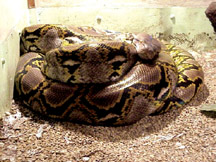|
observer |
|
|
|
|
|
OTHER LINKS |

|

|

|
Snake facts - more snake bites in Sri Lanka, than in other 'snaky' placesAustralia is positively lousy with snakes, especially venomous ones. It has nine of the 10 deadliest snakes in the world.
An estimated 120 snake species live in the United States, only 20 of which are venomous. Every state has at least one venomous species, except Maine, Alaska and Hawaii. Habitat destruction worldwide has endangered many populations. There are other threats to their survival, too. For instance, every year seven states hold "rattlesnake round-ups" as fund-raisers, bringing folks together to taunt, club, skin and eat the snakes. The most dangerous animal, once again, wins. Snake safetyWhen you're out in areas where snakes may reside, follow these precautions to avoid surprise encounters: * Wear closed shoes - hiking boots or heavy walking shoes. Look before you step, especially around fallen trees and in heavy brush. Keep to the hiking paths. * Keep hands and feet out of areas you can't see, especially places snakes like to hang out: rock crevices, heavy brush or hollow logs. Don't pick up rocks or firewood unless you are out of a snake's striking distance. (A snake can strike half its length.) * Set up camp in a cleared area. Do not place your sleeping bag next to brush, tall grass, large boulders or trees where snakes might live or nest. * If you see a snake, leave it alone. Most people are bitten because they try to kill a snake or get a closer look at it. * Non-venomous snake bites for three reasons 1. You smell like food. If you have recently handled a warm-blooded animal, such as mice, guinea pigs, even cats, wash your hands thoroughly before going out 2. The snake feels threatened. Don't make fast movements in its direction, or reach down toward it. 3. They are afraid. Generally, snakes avoid confrontation, but if cornered or otherwise unable to get away they may strike, more to warn than to attack. SOURCES: DR. SINGH MANBIR, MANBIR-ONLINE.COM, and U.S FDA **** IF YOU'RE BITTEN: * Wash the bite with soap and water. * Immobilize the bitten area and keep it lower than the heart. * Get medical help as soon as possible. While not all bites from venomous snakes actually inject venom, it's important to get checked out. Even a bite from a nonvenomous snake can cause an infection or allergic reaction in some individuals. * If you can't get to medical care within 30 minutes, wrap a bandage two to four inches above the bite; it may help slow from circulating. Do not cut off blood flow from a vein or artery. A good rule of thumb is to make the band loose enough that a finger can slip under it. * A suction device, usually included in commercial snakebite kits, may be placed over the bite to help draw venom out of the wound without making cuts. Do not make any incisions, as these may only cause further injury. SOURCE: THE AMERICAN RED CROSS |
 Yet, surprisingly, death by snakebite is relatively uncommon, though
an estimated 3,000 Australians are bitten by venomous snakes every year;
India and Sri Lanka, on the other hand, have lots of snakebite
fatalities. Poor living conditions rats and other small animals attract
snakes as well as poor healthcare access in some areas contribute to the
high mortality rates.
Yet, surprisingly, death by snakebite is relatively uncommon, though
an estimated 3,000 Australians are bitten by venomous snakes every year;
India and Sri Lanka, on the other hand, have lots of snakebite
fatalities. Poor living conditions rats and other small animals attract
snakes as well as poor healthcare access in some areas contribute to the
high mortality rates. 







